

Scrapbook by Facebook: What parents should know. AVG Privacy Glasses Thwarts Facial Recognition Technology. Just when you thought that a company like AVG would offer nothing more than anti-virus products, here is word that they have something far better – a pair of “privacy glasses” that might just help keep your identity safe from Facebook tags and the ilk.

Basically, wearing this pair of privacy glasses make life difficult for cameras as well as various other facial recognition technologies to have a clear look at your identity. How does such a unique pair of glasses work? In the first place, there are infrared LEDs which will frame the eyes as well as the nose areas, and taking into consideration how infrared lights happen to be totally invisible to human eyes, the glasses can be worn just like your standard issue glasses. Since these LEDs can be detected by cameras that are sensitive to that wavelength of light, the glasses will break up face detection.
Not only that, retro-reflective materials will do their job by reflecting light back at the same angle in which it arrives. Tips For Parents: Facebook Privacy For Teens. What is the most scary thing for parents of teens?
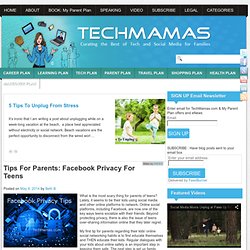
Lately, it seems to be their kids using social media and other online platforms to network. Online social platforms, including Facebook, are now one of the key ways teens socialize with their friends. Beyond protecting privacy, there is also the issue of teens over-sharing information online that they later regret. Tips For Parents: Facebook Privacy For Teens. Randi Zuckerberg Not Happy About Facebook Photo Privacy Breach.
Lovers of irony take note: Mark Zuckerberg's sister Randi has complained about a Facebook privacy breach.
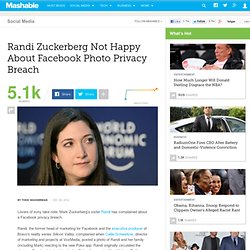
Randi, the former head of marketing for Facebook and the executive producer of Bravo's reality series Silicon Valley, complained when Callie Schweitzer, director of marketing and projects at VoxMedia, posted a photo of Randi and her family (including Mark) reacting to the new Poke app. Randi originally circulated the photo on Facebook to her friends, but Schweitzer posted it publicly on Twitter: Zuckerberg and Schweitzer have since deleted the conversation, but according to BuzzFeed, Schweitzer originally wrote "@randizuckerberg demonstrates her family's response to Poke" with a link to the pic.
Randi then replied "@cschweitz: Not sure where you got this photo. Tech firms agree to privacy protections for mobile apps. SAN FRANCISCO--California's Office of the Attorney General has gotten agreements from Apple, Google, Microsoft, Amazon, Hewlett-Packard, and Research In Motion to improve privacy protections on mobile apps.
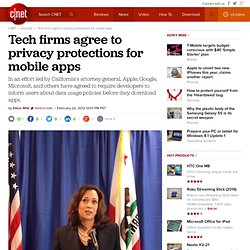
The companies will require developers to include privacy policies in their apps so that users will be informed about the data that apps will access, use, and share before they download the apps, California Attorney General Kamal Harris said today in a news conference. The news follows disclosure that some mobile apps were using address book data without user notification or permission. Basically, California's Online Privacy Protection Act, one of the strongest consumer privacy laws in the country, will now be applied to mobile apps, which currently have no privacy protections, Harris said.
"This will give more information to the consumers so they understand how their personal and private information can be used and potentially manipulated," Harris said. And last May, U.S. FTC: Apps for Children Raise Privacy Concerns. Mobile application marketplaces, developers and service providers need to do a better job of protecting children's privacy, according to an Federal Trade Commission (FTC) report released Thursday.
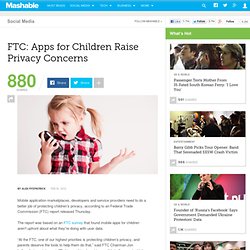
The report was based on an FTC survey that found mobile apps for children aren't upfront about what they're doing with user data. “At the FTC, one of our highest priorities is protecting children’s privacy, and parents deserve the tools to help them do that,” said FTC Chairman Jon Leibowitz in a statement. "Right now, it is almost impossible to figure out which apps collect data and what they do with it. The Do Not Track Kids Act. Kids today enjoy unprecedented access to the Internet.
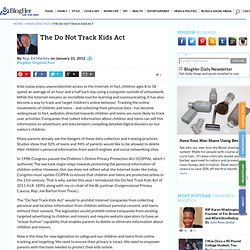
In fact, children ages 8 to 18 spend an average of an hour and a half each day using a computer outside of schoolwork. While the Internet remains an incredible tool for learning and communicating, it has also become a way to track and target children’s online behavior. Tracking the online movements of children and teens - and collecting their personal data - has become widespread. In fact, websites directed towards children and teens are more likely to track user activities. Companies that collect information about children and teens can sell this information to advertisers and data brokers, compiling detailed digital dossiers on our nation’s children. Many parents already see the dangers of these data collection and tracking practices. Apophenia » Blog Archive » Facebook is a utility; utilities get.
From day one, Mark Zuckerberg wanted Facebook to become a social utility. He succeeded. Facebook is now a utility for many. The problem with utilities is that they get regulated. Yesterday, I ranted about Facebook and “radical transparency.” Privacy Reboot Needed. I’m sitting in a talk listening to Dennis Crowley, co-founder of Foursquare (that’s a photo of Dennis during the talk above).
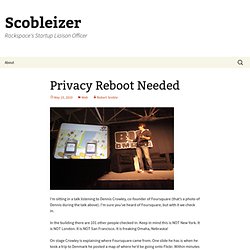
I’m sure you’ve heard of Foursquare, but with it we check in. In the building there are 101 other people checked in. Keep in mind this is NOT New York. It is NOT London. Privacy and the Treacherous Middle Ground. I've always thought that in the venture capital business you either want to be very early or very late but not in the middle.
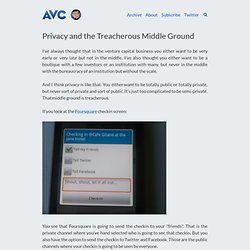
I've also thought you either want to be a boutique with a few investors or an institution with many, but never in the middle with the bureaucracy of an institution but without the scale. And I think privacy is like that. You either want to be totally public or totally private, but never sort of private and sort of public. Facebook's Approach To Innovation Is The Secret To Its Success. Facebook Privacy: A Bewildering Tangle of Options - Graphic - NY. How to Keep Your Privacy Safe(r) on Facebook - PCWorld. I'm not ready to give up on Facebook yet, like my friend Jason Perlow, but I can understand why he's sick to death of it.
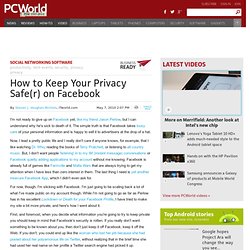
The simple truth is that Facebook takes lousy care of your personal information and is happy to sell it to advertisers at the drop of a hat. Now, I lead a pretty public life and I really don't care if anyone knows, for example, that I like watching Dr. Who; reading the books of Terry Pratchett, or listening to alt.country music. Check Your Facebook Privacy Settings With ReclaimPrivacy. Facebook's Zuckerberg Says The Age of Privacy is Over. Facebook founder Mark Zuckerberg told a live audience yesterday that if he were to create Facebook again today, user information would by default be public, not private as it was for years until the company changed dramatically in December.
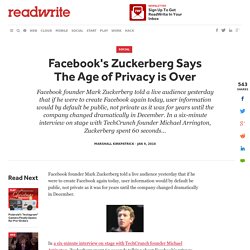
In a six-minute interview on stage with TechCrunch founder Michael Arrington, Zuckerberg spent 60 seconds talking about Facebook's privacy policies. His statements were of major importance for the world's largest social network - and his arguments in favor of an about-face on privacy deserve close scrutiny. Zuckerberg offered roughly 8 sentences in response to Arrington's question about where privacy was going on Facebook and around the web. The question was referencing the changes Facebook underwent last month. Your name, profile picture, gender, current city, networks, Friends List, and all the pages you subscribe to are now publicly available information on Facebook. The Day Has Come: Facebook Pushes People to Go Public. Facebook announced this morning that its 350 million users will be prompted to make their status messages and shared content publicly visible to the world at large and search engines.
It's a move we expected but the language used in the announcement is near Orwellian. New Tools to Control Your Experience. Why Facebook Changed Its Privacy Strategy. We reported yesterday that Facebook is aiming to get people to be more public on the site and that anyone who hasn't changed their privacy settings will now see it "recommended" that their status updates, photos etc. be exposed to the whole web. I had a unique opportunity to speak to Barry Schnitt, Director of Corporate Communications and Public Policy at Facebook and quite a frank guy, at length this afternoon about Facebook's privacy policy changes.
Schnitt said "your understanding is basically correct," but disagreed with the negative light I saw the change in. How Facebook's New Privacy Changes Will Affect You. In a late night post on Facebook's company blog, CEO Mark Zuckerberg announced a round of upcoming changes that will affect all users of the social network. Specifically, the changes focus on new privacy controls for information sharing. For those who have been following Facebook closely, the announcement doesn't deliver any new information, it only confirms some previously discussed plans. However, for Facebook's user base, now 350 million strong, the updates represent a major overhaul as to how privacy is handled on the site. Also check out ReadWriteWeb's ongoing series on the top products of 2009: Change #1: No More Regional Networks Over the years, Facebook has grown from a tightly closed social network designed for connecting college students to an entirely open network which anyone and everyone can join.
This update isn't exactly news - the company revealed their plans to remove regional networks back in July of this year. More Ways to Share in the Publisher. 5 Easy Steps to Stay Safe (and Private!) on Facebook. When the President of the United States warns schoolchildren to watch what they say and do on Facebook, you know that we've got a problem...and it's not one limited to the U.S.'s borders, either.
People everywhere are mindlessly over-sharing on the world's largest social network, without a second thought as to who's reading their posts or what effect it could have on them further down the road. For example, did you know that 30% of today's employers are using Facebook to vet potential employees prior to hiring? In today's tough economy, the question of whether to post those embarrassing party pics could now cost you a paycheck in addition to a reputation. (Keep that in mind when tagging your friends' photos, too, won't you?)
What Facebook Quizzes Know About You. The Northern California chapter of the American Civil Liberties Union (ACLU) has put together a campaign to raise awareness of privacy issues surrounding Facebook applications, in particular quizzes. Obama’s Advice to Aspiring Politicians: Be Careful on Facebook - Log in to What Do Quizzes Really Know About You?
10 Solid Tips to Safeguard Your Facebook Privacy. Facebook statistics show that it has 250 million active users each with an average 120 friends. More than 1 billion photos are uploaded every month by its users, over 70% of whom use applications like games and quizzes in Facebook. Unfortunately, most users don’t know the implications of entering personal information, making friends, and playing games on Facebook. Facebook Privacy Scanner.